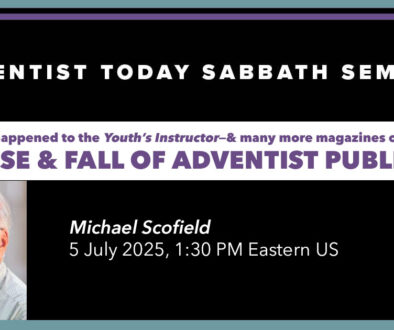Sharing Scripture, April 7-13
[symple_heading style=”” title=”The Rhythms of Life” type=”h1″ font_size=”40″ text_align=”center” margin_top=”0″ margin_bottom=”30″ color=”undefined” icon_left=”” icon_right=””]
This is a tool for you to use if you lead a Sabbath School (SS) class or small group. It is keyed to the Bible texts used in the current week’s Adult SS Lesson and includes a brief story from current news you can use to introduce the discussion and then a series of discussion questions in a relational pattern designed to build fellowship and spiritual reflection.
Texts: Ephesians 1:1-4; Matthew 22:35-37; Matthew 7:24-25; Proverbs 18:24; 1 Corinthians 15:33; Ecclesiastes 2:1-11
Amazon’s value crossed $1 trillion in September 2018. CEO Jeff Bezos explained Amazon’s success by outlining two types of decisions entrepreneurs and executives make. Type 1 decisions represent a door you walk through and can’t go back, such as quitting a well-paying job to focus on your side passion. “These decisions must be made methodically, with great deliberation and consultation.” Type 2 decisions represent a reversible choice, for example, testing a new product with a group of customers or the layout of a section on the Amazon store.
Bezos advises spending up to 10% of your work week on Type 1 decisions. These are draining and time-consuming. Don’t make Type 1 decisions while feeling angry, hungry, lonely or because you’re tired of the process. It’s not a good idea to quit your job because you feel despondent on a Monday morning. You can make Type 2 decisions quickly, even delegating them to team members. Rather than letting emotions overwhelm you, learn what you can about the problem.
Plan to learn from failures. Amazon has taken many chances over the years. Some, like the Kindle, paid off. Others, like the Amazon Fire Phone were expensive flops. Bezos believes failures are part of the job. “You’re still going to be wrong nine times out of ten. In business, every once in a while, when you step up to the plate, you can score 1,000 runs. It’s important to be bold. Big winners pay for the many previous experiments.” After all, entrepreneurs or executives who embrace their choices learn far more than the people who run away. [1]
This week’s lesson examines the choices we make. Scripture gives us vital counsel on how to make good choices in life. It’s important to understand that we really do have our God-given freedom of choice. Our life’s course (including eternal life) is not predestined by God, or some impersonal force of fate. Even when our lives seem to be spiraling downward, we can regain an element of control over our lives by taking charge of our own choices.
Often, it’s small, seemingly insignificant choices that can lead to big changes in our life’s course. Choosing the right friends—as Mom always advised us—may seem like a small thing, but those influences affect our ability to see the bigger picture later on in life. We have a great amount of latitude to choose who and what will influence our thinking, and ultimately our ability to make good choices. The simple basics like prayer, Bible study and the counsel of God-fearing friends can always provide the proper perspective to make those choices.
~cb
Connecting: Discuss this old riddle: Imagine there are two doors. Behind one door is eternal bliss, and the other leads to a horrible death. I give you two clues: 1) Door #2 opens to eternal bliss, and 2) I always lie. Which door do you choose, and why?
Sharing: After reading Ecclesiastes 2:1-11, why do you think so many people—even Bible-believing Christians—choose to run after worldly pleasures?
- We each think that we can resist the harmful effects of these pleasures
- It’s human nature to turn a blind eye to the potential long-term damage of something harmful that we really crave
- Occasionally we see someone who doesn’t seem to be harmed by their sinful choices
- Like the Teacher of Ecclesiastes, we rationalize that we are just testing ourselves to discover if something is really as bad as people say
- Humans, without the uplifting influence of the Holy Spirit, naturally tend toward bad choices
- Other:
Applying: Your best friend tells you about a wonderful investment opportunity. He is withdrawing all of his retirement savings to invest in this scheme, and he wants you to do the same. What counsel would you give your friend?




